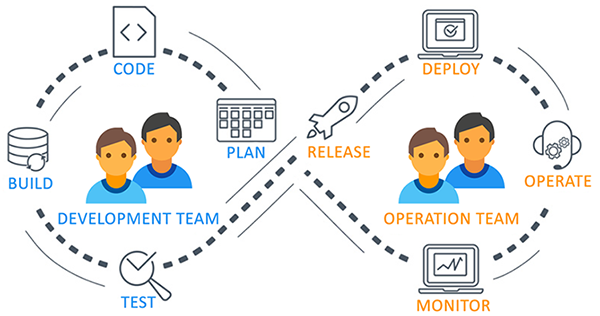For a long time, development and operations were isolated modules. Developers wrote code; the system administrators were responsible for its deployment and integration. As there was limited communication between these two silos, specialists worked mostly separately within a project. That was fine when Waterfall development dominated. But since Agile and continuous workflow have taken over the world of software development, this model is out of the game. Short sprints and frequent releases occurring every two weeks or even every day require a new approach and new team roles.
DevOps is Development and Operation’s Collaboration, It’s a Union of Process, People and Working Product that enable continuous integration and continuous delivery of value to our end users. DevOps accelerate the process to deliver applications and software services at high speed and high velocity. So that organizations can learn and Adopt the market at its earliest. Also, it minimizing the risk factor by continuously delivering and getting end-users and stakeholders feedback at the early stages.

How DevOps Works
DevOps is the practice of operations and development engineers that work together in the entire project life-cycle, from design and development process to production releases and support.

Starting from design and development to testing automation and from continuous integration to continuous delivery, the team works together to achieve the desired goal. People having both development and operations skill sets working together and use various tools for CI-CD and Monitoring to respond quickly to customers need and fix issues and bugs.
Why DevOps Matters
In today’s competitive software Industry, Automation and AI plays a major role and to stay ahead in the market and attract your stakeholders and customer we must transform and adapt the DevOps Best Practices. So Why you need DevOps in First place, well
- To stay ahead in the market as competitors are already doing this.
- To increase velocity of the team as well as product delivery.
- To reduce downtime and within a minimum time limits, update the changes on the production.
- To reduce human error by doing all work automated.
Advantages of DevOps
Following are the main benefits of DevOps Practices.
1. Break down the Silos:
I believe the most important benefit using DevOps is to break down the Silos as the Cross-functional development team and operation team works together that is possible due to the self-organized approach of work.
2. Speed:
Delivering the highest business value item quickly and faster product delivery in the market as DevOps follows Agile Principles.
3. Rapid Delivery:
Frequently release the working product in the market to satisfy the market and more importantly customers need, that improves the ROI (Return on investment).
4. Reliability:
By following DevOps best practices and using the best tool for Continuous Integration, Testing Automation, and Continuous Delivery and monitoring the logs helps the team to stay updated and take the real-time decision quickly.
5. Team Collaboration:
DevOps improves the collaborations between the Dev Team and Ops Team, Team works together towards the common business goal.
6. Security:
While implementing automation Security is a very important factor, By Following DevOps model and using Infrastructure as code and by doing automation of process and compliance policies, one can take control security configuration.
7. Risk Management:
Using this practice we can Identify the risk factor early in the application lifecycle stages. Early detection of any issues or bug and quick correction or fixes helps to stay ahead in the competition.





No comments:
Post a Comment